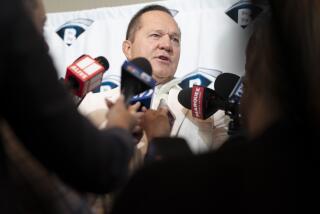Baseball: a Week to Live : Negotiations: If there is no bargaining agreement by Sept. 9, Selig proposes that the season be canceled.
- Share via
If there is no bargaining agreement by next Friday, the remainder of the 1994 baseball season, including the playoffs and World Series, will be canceled.
That fact became clear Friday when acting Commissioner Bud Selig proposed the termination date to Donald Fehr, executive director of the players’ union, in a telephone conversation.
They are expected to make this official early next week, but the players have no real control over it.
And with no sessions scheduled for the Labor Day weekend and beyond, Colorado Rockie owner Jerry McMorris, who met with Fehr for four hours Wednesday night in an informal attempt to keep the negotiating process alive, said it would take a “major miracle” to save the season.
“This was not done to force anybody’s hand,” Selig said of the Sept. 9 date. “It was sheer pragmatism.
“You can’t turn the last two weeks of the season into a farce. You can’t have pitchers working three innings in the middle of a pennant race.
“There were a lot of factors. The players will have been out four weeks as of Friday and would require another week to get in shape. How meaningful would two more weeks of the season be?
“There was also the logistical question of reorganizing ticket departments and trying to promote a new playoff format. There is so little time for a viable lead-in to the playoffs. It’s just a matter of common sense.”
That and dollars, of course.
The owners had projected TV revenue of $140 million from the postseason, but amid the uncertainty of a players’ strike now in its 23rd day, advertisers have been bailing out since early August.
That figure has shrunk to considerably less, and Selig is said to have been fielding a barrage of calls from owners angry over the refusal of the union to respond to their salary-cap proposal and the financial impact of the strike.
Selig had tentatively set Sept. 15 as the deadline, but bowed to the urging of other owners willing to cancel the World Series for the first time in history and get on with unilateral implementation of the new compensation system.
Of the potential loss of the World Series, Selig said he was “very concerned and very troubled, but I’m more concerned about not achieving a meaningful solution to our economic problems. It would be more painful and more enduring if we don’t address them. As I’ve said before, we’ve put if off for too many tomorrows, and tomorrow is now here.”
An agreement with the union prevents the owners from unilaterally implementing a new system before the end of the scheduled championship season. The union believes that has been the owners’ goal all along.
“This has been their two-year timetable,” said Gene Orza, the union’s associate general counsel. “Nothing we have said or done has mattered. They’ve been determined to shove the salary cap down our throats. They’re right where they want to be.”
It is believed that the union would respond to unilateral implementation by asking the National Labor Relations Board to overturn it--a long and difficult process--and would then resume the strike next spring. The owners’ proposal would also eliminate salary arbitration and create a new free-agency system, leaving a multitude of contractual problems to be resolved during the winter.
Is there any chance of a settlement by next Friday?
“It can be done, but not if the salary cap is still on the table,” Orza said. “People talk about compromise, but there is no in-between in this negotiation, no halfway point. We either take the salary cap or we don’t, and we don’t.”
Asked if there is any flexibility to Sept. 9, if it could be moved back should negotiations resume at a meaningful level, Selig said: “Common sense would have to prevail. All I can tell you is that nothing is scheduled, and we’re on tenuous ground timewise. We’re at a point of diminishing return.”
The players have a $175-million-plus strike fund to get them through the days without paychecks. Distributions will start on Sept. 15. Players who have been contributing to the fund from their licensing revenue over the last four years will receive $10,000 each. Players who contributed for a shorter time will receive less.
Secretary of Labor Robert Reich lashed out at both the owners and players even before Selig proposed the Sept. 9 termination. He said they had taken their fans for granted and turned the national pastime into a symbol of “national greed.”
Reich added that his department had provided mediators and done everything it could to assist the process but had seen no determination for meaningful negotiation by either owners or players.
“A pox on both your houses,” he said.
More to Read
Go beyond the scoreboard
Get the latest on L.A.'s teams in the daily Sports Report newsletter.
You may occasionally receive promotional content from the Los Angeles Times.









